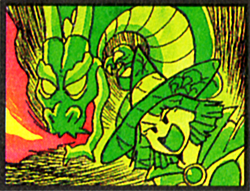Puff!
| Puff! | |
|---|---|

| |
| Japanese | ドラゴラム |
| Rōmaji | Doragoramu |
| Type | Support |
| Older names | Bedragon |
Puff! (originally localized as BeDragon) is a spell in the Dragon Quest series. It transforms the user into a dragon, during which they will automatically attack with deadly claws and assorted breath weapons until the effect wears off. It should not be confused with Puff Puff.
Appearances
Dragon Quest III
Puff! is learned by both magi and sages at level 34. It is worth noting that the flame breath used in the dragon form negates the defenses of metal monsters, instantly slaying any that linger long enough to be hit by it. The spell also reduces the caster's agility considerably.
Damage output depends on the foe's resistance to fire, differentiating the seminal spell from it's subsequent appearances. The possible damage output is 170~190, 136~151, 102~113, and 85~94.
Dragon Quest IV
Puff! is learned by Maya at level 30, and by Psaro at level 49. When cast, the user alternates between breathing fire and ice upon all foes, dealing 80~100 damage. The transformations lasts for 6~9 turns. In the original version the flames would pierce the defences of metal slimes, but this property has been removed from the PSX remake (as well as later titles).
Dragon Quest V
The transformation takes effect immediately in this instalment, immolating all foes with flames for 65~85 damage for 6~9 turns. The caster is now also granted an immunity to Sizz-family spells and fire breath while transformed.
| Name | Level |
|---|---|
| King cureslime | 20 |
| Daughter | 32 |
| Dracky | 38 |
| Wiz pip | 55 |
The Hero can achieve the benefit of the spell through the use of the Dragon staff as an item in battle.
Dragon Quest VI
Puff! can only be obtained by mastering the Monster Master vocation.
Unlike in earlier installments, this transformation only uses Flame Breath and Chilly Breath. The effects of the spell last for the usual variable of turns.
Dragon Quest VII
Etymology
The word Puff is a reference to Puff, the Magic Dragon, a song written by Leonard Lipton and Peter Yarrow in 1963.